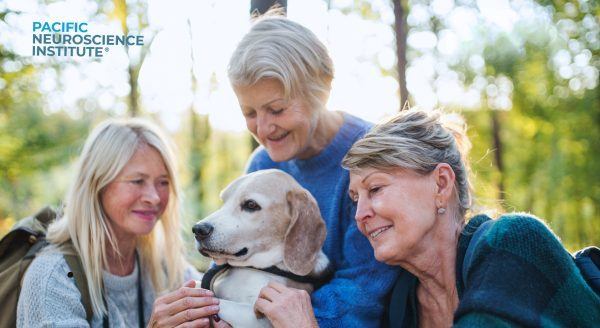

How These ‘Simple 7’ Lifestyle Habits Can Help Lower Risk of Dementia for Women
by Guest Author
- Women make up about two-thirds of the people who have dementia.
- Researchers say women can lower their risk for the disease by adopting 7 healthy lifestyle habits recommended by the American Heart Association.
- The daily habits include being active, having a balanced diet, and maintaining healthy blood pressure.
Women who follow seven healthy habits might lower their risk of developing dementia, according to new research presented at the American Academy of Neurology’s 75th Annual Meeting this week.

In their study, researchers followed 13,720 women for 20 years to analyze their risk of developing dementia. They examined Medicare claims at the end of the study to determine who received a diagnosis.
The women received a score for seven health factors, with 0 corresponding to “poor” and 7 as “excellent.” The average score at the beginning of the study was 4.3. At the 10-year follow-up, it was 4.2.
At the 20-year follow-up, 1,771 women had been diagnosed with dementia.
After adjusting for factors such as age and education, the researchers found that for every increase of one point in overall score, the participant’s risk of dementia decreased by 6%.
One limitation of the study is that researchers did not receive information that allowed them to see how changes in healthy habits, such as quitting smoking, influenced the risk of dementia.
The findings also have not been published yet in a peer-reviewed journal.
The 7 health lifestyle habits
The researchers used the American Heart Association’s “Life’s Simple 7”Trusted Source lifestyle habits for their study.
Those seven factors are:
- Being active
- Eating better
- Maintaining a healthy weight
- Not smoking
- Maintaining healthy blood pressure
- Controlling cholesterol
- Having low blood sugar
However, there is positive news regarding this situation. It’s not a matter of all or nothing. Even if individuals have a good score in a few areas, they will still experience some benefits.
Making incremental improvements to your long-term health through habit changes is valuable. The sooner these changes are implemented and maintained, the better. The goal is to find a simple method for monitoring one’s health.
What is dementia?

“Dementia is an overall decline in cognitive ability, usually impacting short-term memory (learning/recalling new information) and another cognitive ability (or more), such as decline in executive skills (organization, decision making) or language, or visual-spatial skills,” says Karen Miller, PhD, a neuropsychologist and geropsychologist as well as the senior director of the Brain Wellness and Lifestyle Program at Pacific Neuroscience Institute in California.
“In dementia, these declines typically impact one’s ability to be completely independent (i.e., the person may have difficulty managing finances or medications, difficulty/impairment in driving, etc.),” she told Healthline.
Women make up about two-thirds of people with dementia, including Alzheimer’s disease, according to a 2021 report.
One reason is that women live longer than men and dementia typically appears after age 80. Other possible explanations, according to Cognitive Vitality, a program of the Alzheimer’s Drug Discovery Foundation, include:
- Higher education is associated with lower rates of dementia. Many older women today were not afforded the same educational opportunities as men.
- Dementia is linked to depression, and more women have depression than men.
- People who exercise are less likely to develop dementia and women exercise less than men.

When women develop dementia, they decline faster than men do. Therefore, they can have a more severe illness.
Dementia occurs when neurons in the brain stop working or interacting with other brain cells, according to the National Institute of Aging.
Everyone loses some neurons as they age, but people with dementia have a more significant loss.
While many people over 85 have dementia, it is not considered a normal part of aging.
Types and symptoms of dementia
Alzheimer’s disease is the most common form of dementia, but it is not the only one.
A few other types of dementia include the following:
- Frontotemporal dementia
- Lewy body dementia
- Vascular dementia
Some people can have a combination of two or more types of dementia.
Signs and symptoms of dementia include:

- Experiencing memory loss, poor judgment, and confusion.
- Difficulty speaking, understanding, and expressing thoughts, or reading and writing.
- Wandering and getting lost in a familiar neighborhood.
- Trouble handling money responsibly and paying bills.
- Repeating questions.
- Using unusual words to refer to everyday objects.
- Taking longer to complete routine daily tasks.
- Losing interest in normal daily activities or events.
- Hallucinating or experiencing delusions or paranoia.
- Acting impulsively.
- Losing balance and problems with movement
It is important to note when symptoms are worsening, experts say.
If individuals or their loved ones begin to notice these symptoms, it might indicate the need to consult a healthcare professional. This holds true for any new changes, symptoms, or a deterioration of existing symptoms. While certain treatments like aducanumab and lecanemab cannot cure or reverse the damage completely, they have the potential to slow down the progression of the disease. The availability of new treatments is an additional motive for seeking medical advice.
Adapted from the original article in Healthline.
Memory Concerns? We Have a Program for You.

Whether you have been diagnosed with a neurodegenerative disorder or are seeking proactive interventions, the Lifestyle Program is the perfect fit for you. Explore evidence-based strategies designed to enhance cognitive fitness and optimize memory. Our brain health specialists focus on five key areas to support your brain health:
- Optimize memory
- Improve nutrition
- Reduce stress
- Upgrade fitness
- Regulate sleep
How to Enroll in the Lifestyle Program
Offered in group or individual sessions, as well as both virtually or in-person, Lifestyle courses are truly made for everyone. If you or a loved one are ready to transform your lifestyle, click here to sign up, or call 213-344-2037.
1301 20th Street, Santa Monica, CA 90404
213-344-2037 / voicemail
Useful Links
- Lifestyle Program
- Pacific Brain Health Center
- Alzheimer’s Disease
- Dementia
- Mild Cognitive Impairment
Related Articles
Last updated: July 20th, 2023



